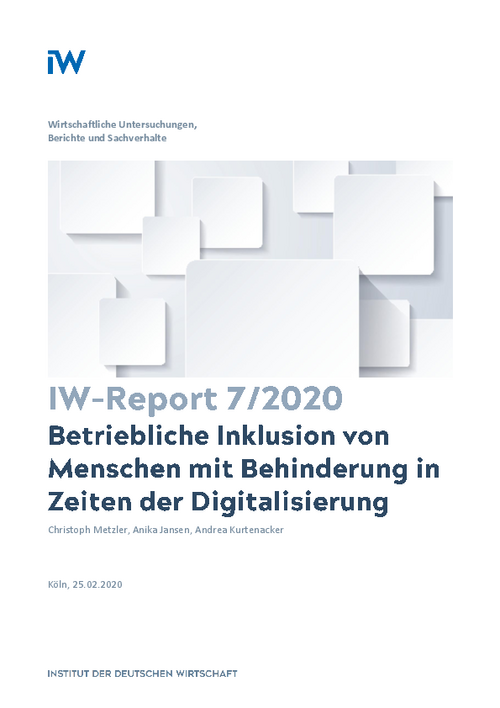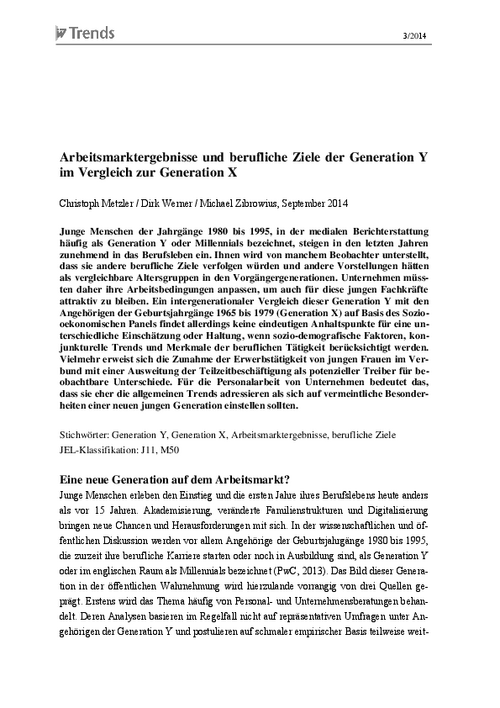Topics

Dr. Christoph Metzler
Senior Economist for Vocational Training and Supply of skill needs
Tel: +49 221 4981-871 Mail: metzler@iwkoeln.de Christoph Metzler @TophAndre- At the IW since 2012
- Diploma studies in business education at the University of Mannheim and part-time doctorate in economics with a focus on entrepreneurship at the University of Siegen
- Application and implementation-oriented research in various projects on dual vocational training and personnel policy in times of digitalization and for people with (health-related) disadvantages
Research unit
IW Publications
(in cooperation with Dirk Werner)
Die Erwerbssituation von Menschen mit Behinderung
IW-Trends 4/2017
(in cooperation with Susanne Seyda, Luisa Wallossek, Dirk Werner)
Menschen mit Behinderung in der betrieblichen Ausbildung
IW-Analyse – Forschungsberichte Nr. 114, Köln 2017
(in cooperation with Sarah Pierenkemper, Susanne Seyda)
Menschen mit Behinderung in der dualen Ausbildung – Begünstigende und hemmende Faktoren
IW-Trends 4/2015
(in cooperation with Dirk Werner, Michael Zibrowius)
Arbeitsmarktergebnisse und berufliche Ziele der Generation Y im Vergleich zur Generation X
IW-Trends 3/2014
Expertises
(in cooperation with Regina Flake, David Meinhard, Valerie Müller, Susanne Seyda, Dirk Werner)
Mit beruflicher Weiterbildung die Digitalisierung meistern. Was IHK, IHK-Bildungszentren und DIHK-Bildungs-GmbH für Unternehmen anbieten und als Umsetzungspartner leisten können, Köln, 2019
Studie für DIHK-Bildungs-GmbH
(in cooperation with Sarah Pierenkemper, Beate Placke, Susanne Seyda, Dirk Werner)
Menschen mit Behinderung in der dualen Berufsausbildung – Die Perspektive von kleinen und mittleren Unternehmen (KMU)
KOFA-Studie, Köln 2016
External Publications
Arbeit der Zukunft – Herausforderungen erkennen, Lösungen menschlich gestalten
CCV News, 2019, S. 24–25
(in cooperation with Susanne Seyda)
Ausbildung – Unwissen macht Angst
Wirtschaft und Erziehung, Heft 4, 2016
(in cooperation with Sarah Pierenkemper)
Die betriebliche Ausbildung von Menschen mit Behinderung – Hemmnisse, gewünschte Unterstützung und präferierte Partner aus Unternehmenssicht
BWP@, Nr. 30, 2016
(in cooperation with Susanne Seyda)
Erwartete und tatsächliche Hemmnisse und Lösungen für und in der Ausbildung von Menschen mit Behinderung und Unternehmenssicht
KOFA-Studie, Köln, 2016
(in cooperation with Sarah Pierenkemper, Beate Placke, Susanne Seyda, Dirk Werner)
Menschen mit Behinderung in der dualen Berufsausbildung - Die Perspektive von kleinen und mittleren Unternehmen (KMU)
Carsten Kreklau, Josef Siegers (Hrsg.): Handbuch der Aus- und Weiterbildung, Aktualisierungslieferung 265, 2015
(in cooperation with Michael Zibrowius)
Personalpolitik für die Fachkräfte der Generation Y – Wie Sie vermeiden, in die Generationenfalle zu tappen
Personalführung – das Fachmagazin für Personalverantwortliche, Ausgabe 1, 2015, S. 61–65
(in cooperation with Michael Zibrowius)
(K)eine Generation wie jede andere – Die Generation Y im Vergleich
Bildungspraxis – Zeitschrift für die berufliche Aus- und Weiterbildung, Heft 4, 2014, S. 2–5
(in cooperation with Sebastian Bußmann)
Fachkräfte der Zukunft – im Wettbewerb um junge Talente bestehen
Deutsches Handwerksblatt Ostmecklenburg Vorpommern, Heft 7, 2014, S. 16–17
Fleißige Hände gesucht
W&B - Wirtschaft und Beruf, 66. Jg., Heft 2, 2014
(in cooperation with Daniel Wörndl)
Berufsschullehrer: Nachwuchssicherung als wichtige Aufgabe
Gießerei –die Zeitschrift für Technik, Innovation und Management. Gießerei-Verlag GmbH, 63. Jg., Heft 3, Düsseldorf, 2013, S. 98–100
Gehen dem Guss die Gießer aus – Zur Zukunft der dualen Berufsausbildung
More from Dr. Christoph Metzler

Inclusion of People with Disabilities within Enterprises in Times of Digitization
Digitization has a positive influence on the inclusion of people with disabilities in German companies. Companies that already rely heavily on digitization today employ more people with disabilities than companies that currently do not have any reference to digitization.
IW

The Employment Situation for People with Disabilities
Though there is still room for improvement, the situation on the German labour market for people with severe disabilities is generally good. While in 2013 only 42.8 per cent of 25- to 64-year-olds were employed, 45.6 per cent did not wish to work and only 2.8 per cent were officially unemployed.
IW

People with Disabilities in Germany’s Dual Vocational Training System
Positive and Negative Factors
IW

Labour Market Results and the Career Goals of Generation Y compared with those of Generation X
In the last few years young people born between 1980 to 1995, frequently referred to in the media as Generation Y or Millennials, have been joining the workforce in increasing num-bers. Some observers assume that they have other career goals and a different vision than the preceding cohort and consequently advise companies wishing to remain attractive to these young skilled workers to adapt their working conditions accordingly. However, a comparison based on the Socio-Economic Panel of this Generation Y with their predecessors in Generation X ( those born between 1965 to 1979) finds that when socio-demographic factors, economic trends and the nature of their work are taken into account there are no unambiguous signs of different perceptions or attitudes. The probable reason for the observable differences proves rather to be an increase in the proportion of women in the workforce combined with an increase in part-time employment. This suggests that HR managers should be responding more to general trends and less to the supposed peculi-arities of a new generation of young employees.
IW